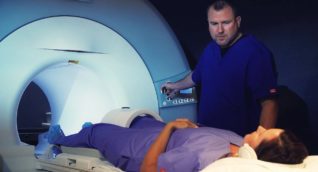MRI provides highly detailed images of the structures of the body. The detail of the images can be enhanced even more when MRI contrast (gadolinium-based) is used during the exam. MRI contrast greatly improves the visibility of organs, inflammation, tumors, and blood supply.
MRI contrast is administered by intravenous (IV) injection in a small vein typically in your arm or hand. The contrast gets eliminated from your body by your kidneys.
Side effects due to gadolinium-based contrast are rare, but they can include nausea, vomiting, headache, and allergy. Overall, allergic reactions to MRI contrast are rare, but in severe cases (1 in 10,000) an allergic reaction may be life threatening. Our clinical staff are fully trained to treat any allergic reaction you might have to gadolinium-based contrast. ARA follows all American College of Radiology (ACR) guidelines for screening kidney function with all applicable contrast agents.
The ACR notes that available data suggest it is safe to continue breastfeeding after receiving contrast. This determination is to be made by the breastfeeding mother in consultation with her physician. Please discuss your breastfeeding options with your medical provider.

